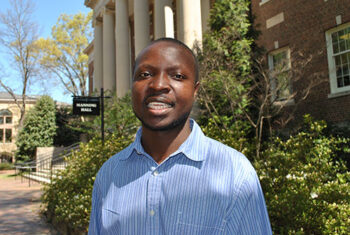William Kamkwamba was born amidst famine and poverty on a farm in Malawi, but with God’s inspiration he fabricated a primitive windmill to bring electricity to his house.
His ingenuity caught the eye of international organizations that opened doors for him and William graduated from Dartmouth College in 2014.
“With a windmill, we’d finally released ourselves from the troubles of darkness and hunger,” the resourceful youth told the Malawi Daily Times. “In Malawi, the wind was one of the few consistent things given to us by God, blowing in the treetops day and night. A windmill meant more than just power, it was freedom.”
William’s improbable journey from farm subsistence in Africa to international mover and shaker in technology education begins with his father, a rough fighting man who settled down after he received Jesus into his heart.
Christianity marked their household as much as poverty. The only boy among six sisters, William shouldered the burden to help his family survive. When rains skipped 2001 and famine clouds gathered, William had to drop out of school in 2002 because the family couldn’t afford the fees.
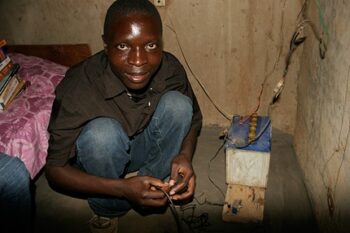 William dutifully toiled the soil, but he never let go of his hunger for learning and frequently visited an internationally-supported library near his home, where he found a couple of books about energy that piqued his curiosity. One was called Using Energy and How it Works.
William dutifully toiled the soil, but he never let go of his hunger for learning and frequently visited an internationally-supported library near his home, where he found a couple of books about energy that piqued his curiosity. One was called Using Energy and How it Works.
As he thumbed through the pages with diagrams, he understood the basic mechanics behind magnetism for generating electricity in a turbine and a windmill. He was a tinkering kid who once disassembled his father’s radio because he thought there were little people inside that he wanted to talk to.
He was not able to reassemble the radio, so when he asked permission of his father to disassemble his bike to build a windmill, his father was resistant. Eventually he prevailed on his father and began to collect scraps of junk to fashion his windmill.
Like Noah building an ark, William became the laughingstock of the townspeople, who watched the formation of his quixotic windmill, resembling a modern art assemblage in the famine-stricken plains of Africa.
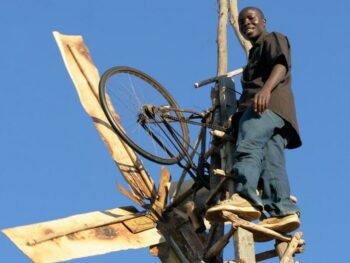
But when William brought light to his house in Mastala Village, a section of the country unreached yet by government’s electrification projects, villagers no longer laughed at him.
“When I was making all these, some people were mocking me that I was going mad but I had confidence in what I was doing because I knew if it was written in the books then it was true and possible,” William remembers. “When I succeeded they were impressed.”
He charged car batteries throughout the day, which then were used to light houses or power radios in the neighborhood.
Encouraged by his first success as a 14-year-old inventor, William next devised a plan to build a larger windmill to pump water during the drought. He received donations from outsiders to help his project.
After his second triumph, the town was no longer at the mercy of darkness or drought.
It was an astonishing feat and the world took note.
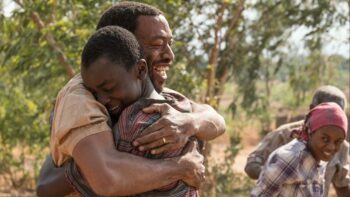
William was invited to speak at a Ted Talk and given the chance to resume his studies after a 5-year lapse. He received a scholarship to study at Dartmouth University, where he attended the Thayer School of Engineering’s Humanitarian Engineering Leadership Program Worldwide.
A documentary was produced on-site of his childhood accomplishments.
His autobiography, The Boy Who Harnessed the Wind, credits God with the inspiration to overcome the cruel capriciousness of Mother Nature and impose order to a chaotic world using rational engineering.
With wind in his sails, William began launching other projects to help boys unable to continue their education. One such project was a soccer team.
“There are a lot of young people like me who drop out of school, and when they drop out of school, they start doing bad things like smoking and drinking,” William said in the Dartmouth college newspaper. “In order to keep them busy, I decided to start a soccer team.”
He has since produced solar-powered water pumps for his and other villages. He’s produced clean water plants, worked on malaria prevention and developed a drip irrigation system, according to his website.
Today, William is employed by Ideo.org, focusing on human-centered design development projects across the globe, from sanitation in India to gender-based violence prevention in Kenya.
He is now working with WiderNet to develop appropriate technology curriculum that will allow people to bridge the gap between “knowing” and “doing.” WiderNet will distribute the content through “e-granaries” around Malawi and across Africa, his website says.
Because God was in his heart, William never accepted his “fate” to a life of poverty and impossibility. The Holy Spirit illuminated his mind to see he could use existing resources to create success.
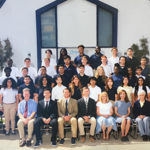 “I want other people to know what I did in such a bad situation,” William says. “There were lots of challenges, and I think it proves that with hard work, anything in life is possible.”
“I want other people to know what I did in such a bad situation,” William says. “There were lots of challenges, and I think it proves that with hard work, anything in life is possible.”
Stephen Lahood studies at the Lighthouse Christian Academy in Los Angeles.

